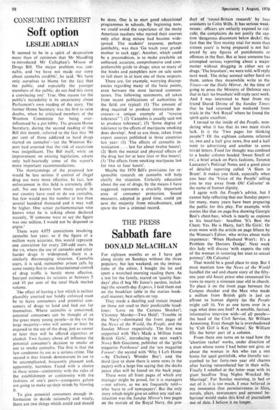CONSUMING INTEREST
Soft option
LESLIE ADRIAN
It seemed to be in a spirit of desperation more than of optimism that Mr Maudling re-introduced Mr Callaghan's Misuse of Drugs Bill. The major problem was can- nabis, and 'we have not made our story about cannabis credible', he said. 'We have only ourselves to blame for the fact that the public, and especially the younger members of the public, do not find this story a convincing one'. True. One reason for the public's incredulity is its uncertainty about Parliament's own reading of the story. The former Home Secretary was the first to raise doubts, when he criticised members of the Wootton Committee for being over- influenced by a pot lobby. The present Home Secretary, during the second reading of the Bill this month, referred to the fact that '90 per cent of those addicted to hard drugs started on cannabis'—yet the Wootton Re- port had asserted that the risk of escalation was insignificant. The Bill itself, while an improvement on existing legislation, adopts only half-heartedly some of the report's more important recommendations.
The shortcomings of the proposed law would be less serious if control of illegal drug use were more effective. In fact, law enforcement in this field is extremely diffi- cult. No one knows how many people in our country have used or do use cannabis, but few would put the number at less than several hundred thousand and it may well be higher. One senior parliamentarian who knows what he is talking about declared recently, 'If someone were to say the figure was one million, I would not be disposed to argue.'
There were 4,075 convictions involving cannabis last year; so if the figure of a million were accurate, this would represent one conviction for every 240-odd users. In the us, where the use of cannabis and other harder drugs is widespread, there is a similarly discouraging situation. Cannabis users, it is said, outnumber prison cells by some twenty-five to one.lnternational control of drug traffic is barely more effective. Interpol estimates its seizures at between 5 and 10 per cent of the total black market volume.
The effect of having a law which is neither plausibly asserted nor boldly enforced must be to leave consumers and potential con- sumers of drugs to fend and find out for themselves. Where cannabis is concerned, potential consumers can be thought of as the great many young people—in the us the large majority—who will sooner or later be exposed to the use of the drug, just as sooner or later they will be offered cigarettes or alcohol. Two factors above all influence the potential consumer's decision to smoke or not to smoke cannabis. The first is that the law condemns its use as a serious crime. The second is that friends demonstrate its use to be uncomplicated, frequently pleasant and, apparently, harmless. Faced with a choice in these terms—conformity with the rules of the establishment or conformity with the fashions of one's peers—youngsters galore are going to make up their minds by blowing it.
To give potential consumers enough in- formation to decide rationally and wisely, there are two things which could and should
be done. One is to start good educational programmes in schools. By beginning now, we could avoid the experience of the many American teachers who started their courses only after drug misuse had become wide- spread. The students' response, perhaps justifiably, was then `Go teach your grand- mother to suck eggs'. Another, which could be a precondition, is to make available an unbiased, accurate, comprehensive and com- prehensible guide to drugs; since so many of the books and pamphlets now on sale seem to fall short in at least one of these respects.
There are, for example, worrying discrep- ancies regarding many of the basic points, even between the most learned commen- tators. The following statements, all taken from recent publications of authorities in the field, are typical: (1) 'The amount of drug required to produce intoxication de- creases—a unique example of "reverse tolerance" '; (2) 'Cannabis is usually said not to produce tolerance; (3) 'Some degree of tolerance to the effects of marijuana smoking does develop'. And so are these, taken from expert sources published in three countries last year: (1) 'The effects of cannabis in- toxication . . . last for about twelve hours'; (2) 'Both the mental and physical effects of the drug last for at least four or five hours'; (3) 'The effects from smoking marijuana last for two to four hours'. - Maybe the 1970 Bill's provisions for re- sponsible research on cannabis will help clarify the situation. Certainly education about the use of drugs, by the means I have suggested, represents a crucially important area of consumer protection. Sound measures, adopted in good time, could yet save the majority from misadventure, and spare the few a criminal record,






























 Previous page
Previous page